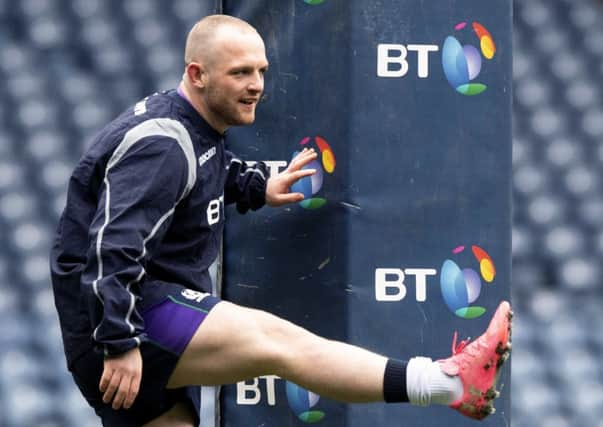Nick Grigg can be Scotland’s David against Welsh Goliaths


Over 3,500 people responded and just three Scots made the public’s combined team, Finn Russell by a long way over Gareth Anscombe, WP Nel and Grant Gilchrist by narrower margins over Tomas Francis and Adam Beard respectively.
Perhaps there are more Welsh supporters or perhaps they are just more active in this sort of thing because hooker Ken Owens was ahead of Stuart McInally by 72 per cent to 28 per cent in the popular vote. Meanwhile, Justin Tipuric got a whopping 91 per cent of the votes leaving Jamie Ritchie with just nine. “Tips” is a class act but Ritchie has been the find of the season, he is Scotland’s top tackler and he boasts four breakdown turnovers, four more than Tipuric.
Advertisement
Hide AdAdvertisement
Hide AdBut even that modest nine per cent looked good beside Nick Grigg’s total. Scotland’s little Kiwi 12 has the misfortune of finding himself going head-to-head with Jonathan Davies, a world class player who shone on two tours for the Lions and won the player of the series award in New Zealand two years ago. Davies got 98 per cent in the public vote and Grigg just two, to which the only possible response is, what on earth were the two per cent thinking?
These things are fun but largely irrelevant and we are all acquainted with the David versus Goliath story. The prize in sport doesn’t always go to the fastest, strongest or most accomplished, which is one of the reasons we love watching it. It goes to those that want it more and the team that sticks together when the going is hard; the side that makes the least mistakes and the team that keeps their discipline when the opposition is squeezing their melon.
A popular vote doesn’t make Davies better than Grigg this afternoon, only the Welshman can do that and he can have an off day. His early season form with the Scarlets was ordinary, and the Scot can play out of his skin. Grigg will be thinking that this could be his last chance to impress on the big stage but he is not the only one sporting blue in need of a big performance.
Admittedly Grigg’s immersion in the Six Nations whirlpool is largely down to a spate of injuries to Mark Bennett, Duncan Taylor, Huw Jones and Matt Scott and the frustrating and unexplained loss of Alex Dunbar’s form. But it’s worth remembering that two missed tackles by Jones last November resulted in two Welsh tries so anyone can make a mistake and Grigg is sure to have been shown that video nasty.
Wind the clock back two years to 2017 when Scotland beat Wales at Murrayfield by the healthy margin of 29-13. In a quick look at the respective line-ups you’d be hard pressed to find three Scots who would have made the combined XV that day – Stuart Hogg, Richie Gray and Russell perhaps, but not too many others.
It didn’t matter because Scotland put in a structured and mature performance, refusing to panic when falling behind early and bouncing back to score 20 unanswered points in a dominant second half, playing with accuracy and a self-belief that has been sadly absent from their last two outings.
Tim Visser has never played better. He made Tommy Seymour’s try, scored one himself, thanks to Hogg’s quick hands, and he prevented Rhys Webb from a certain score.
It is worth noting how Scotland carried the day. Their two tries both came from gaps at the extreme edge of the Welsh defensive line so we can expect – weather willing because hail is forecast – the Scots to attack with width today.
Advertisement
Hide AdAdvertisement
Hide AdThe home team won their set piece on the day, 12 lineouts and six scrums, a sine qua non in the Six Nations, and their tackle success was at 89 per cent compared to the 82 per cent the Scots managed recently in Paris.
The Scots dominated possession and territory with 57 per cent of the second 40 minutes spent in the Welsh half of the pitch and their discipline was good, well, it was better than Wales’, winning the penalty count 10-14. All of which meant that when Wales erred, they paid the price on the scoreboard with Russell kicking five penalties to Leigh Halfpenny’s two.
Generals always fight the last war, as do international rugby coaches, but as an example of how to beat Wales, 2017 is a near perfect blueprint.
Scotland were underdogs two years ago and carry the same mantle this afternoon. Nick Grigg will take heart from the fact that while the rugby public have Wales out of sight, the bookmakers are anticipating a close, nervy affair.